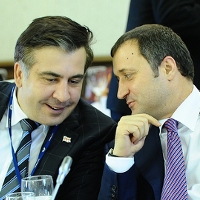“Puppets” Cracked up to be Independent, But Not Anti-Russian
December 27, 2011 -
Dmitry Babich
-
Bez kategorii

filatsaakaszwili_europeanpeopleparty_s.jpg
Can any good thing come from Nazareth? The Western and some Russian media have got so much accustomed to calling the “unrecognized” states on the territories of Moldova and Georgia the Kremlin's puppets that almost simultaneous competitive elections in South Ossetia and Transnistria, as well as a few months earlier in Abkhazia, were a surprise to many.
“South Ossetia Cracked up to be an Independent State” – that was an ironically surprising headline in the Moscow daily Moskovskie Novosti, when in two rounds of elections, held in South Ossetia at the end of November and the beginning of December, the Kremlin’s supposed favourites lost both times. A similar situation emerged in Transistria, where on Sunday the Moscow-favoured speaker of the local parliament, Anatoly Kaminsky, lost to the former speaker Yevgeny Shechuk. The incumbent president Igor Smirnov, whom many Western media had declared “a self-appointed dictator for life,” lost to Shevchuk and Kaminsky in the first round and is definitely on his way out. It should be noted that in both South Ossetia and Transnistria, Moscow was conspicuously cautious in showing its sympathies. The signals did not go beyond unattributed statements of “Kremlin sources” or congratulatory telegrams to some local politicians on minor occasions from the Russian President Medvedev.
To view this merely as a sign of “Moscow’s weakening grip on the separatist regions” and their subsequent return to their former masters in Chisinau and Tbilisi, as some Western analysts have, is a simplification. Alla Dzhioyeva, the winner of elections in South Ossetia in November-December and the likeliest winner of the agreed re-run in March 2012, declared her loyalty to Russia and to Vladimir Putin in person during her recent visit to Moscow. And why shouldn't she be sincere when making this declaration of hers? South Ossetians do feel grateful to Russia for giving them Russian citizenship in the period between 1991 and 2008, when their formal autonomy inside Georgia was despised and rejected by everyone in the world. (Abkhazia and South Ossetia had had their autonomous statuses removed by Georgia’s first and last democratically elected nationalist president, Zviad Gamsakhurdia in 1991, a step that precipitated the first war for independence of South Ossetia in 1991 and of Abkhazia in 1992-1994.)
South Ossetians also feel grateful to Putin and Medvedev for intervening when, in 2008, the young Georgian president, Mikheil Saakashvili, started a “reestablishment of constitutional order” in South Ossetia. That does not mean that South Ossetians were always right in their conflicts with Georgians. Massive breaches of human rights against a lot of Georgians indeed took place both in 1991 and 2008. A lot of modern states were born in suffering and tears. But a new independent South Ossetian state is a reality now, and why shouldn’t it be a democracy and have a chance to be recognized as a democracy by other states of the world and not just Russia?
The same can be said about Transnistria. The new president-elect, Yevgeny Shevchuk, took part in a brief war of Transnistria, which defended itself against an attack of the newly born independent Moldova in 1992. While formally Transnistria was a part of Moldova in Soviet times, this region has a very different history from the rest of Moldova. If this part of Moldova was annexed by the Soviet Union as a result of the infamous Molotov-Ribbentrop pact signed in 1939, Transnistria had been a part of the Soviet Ukraine before being lumped together with Moldova after the Soviet victory in 1944-1945. In 1992, there was a lot of talk about Moldova’s possible return to Romania, and this made Transnistrians even more embittered in their struggle for independence in 1992.
Yevgeny Shevchuk, the winner of the recent second round of elections in Transnistria (73 per cent of the vote against the presumably Moscow-supported Anatoly Kaminsky), was a part of this struggle. He already said his first foreign visit will be to Moscow.
Who is more European, the pro-EU self-declared Romanians living in Moldova or a mixture of Moldovans, Russians and Ukrainians living in Transnistria? In my view, no one has the right to ask or answer this question. A new democratic Transnistrian state is a reality that should be sooner or later recognized by all of the civilized world.
Unfortunately, the West has disqualified itself from participating in the process of democratisation of Moldova, South Ossetia and Abkhazia. It did it by writing off all democratic processes and votes in these regions as “illegal” and “pro-Russian.” The time has come to look at these regions with new focus.
By improving the relations between these new independent countries, the West, Moldova and Georgia can help improve the human rights situation there. It is already a great achievement that Transnistrians can get Moldovam passports for foreign travel. Before Saakashvili came to power in 2003 relations, between Georgians and South Ossetians were also getting better. In fact, if the Georgian population one day returns to South Ossetia and Abkhazia, these people will most likely return to independent states. This would be a much better outcome than the situation we are having now.
Dmitry Babich is a well-known Russian columnist and political analysy. His columns appear regularly in Russia Profile magazine. He is a regular contributor to the Polish bimonthly Nowa Europa Wschodnia.


































